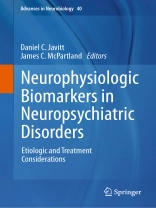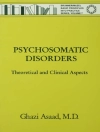This book reviews neurophysiological biomarkers in neuropsychiatric disorders from the viewpoint of the 21st Century Cures Act, which encourages the use of biomarkers for a variety of purposes during drug development. It covers both traditional etiologic uses of biomarkers and the more recent Biomarkers, Endpoint S, and other Tools (BEST) classification scheme used by the FDA, which permits biomarkers for purposes of susceptibility, diagnosis, monitoring, prognosis, pharmacodynamics/response, and safety. The first section of the book describes potential uses of neurophysiologic biomarkers. Subsequent sections focus on a wide range of conditions, including schizophrenia, autism spectrum disorder, Parkinson’s disease, and depression, as well as cross-diagnostic and translational uses, including monkey and rodent analogs. The purpose of the book is to help clinicians understand how neurophysiological biomarkers may be used to understand and manage clinical conditions; to help researchers to understand how biomarkers may be used translationally to test specific theories; and to help pharma investigators to understand how biomarkers can be used to accelerate treatment development.
Cuprins
Introduction to volume: Biomarkers in Psychiatry.- Part I: Government and Pharma perspectives on biomarker development.- Biomarker Methodologies: a NIMH Perspective.- Neural Circuitry-related biomarkers for drug development in psychiatry – An industry perspective.- Public Private Partnerships for Neuropsychiatric Drug Development: A Perspective.- Part II: Biomarker methodologies and Translational Approaches.- Methods for and use of functional magnetic resonance imaging in psychiatry.- Advanced methodology for neurophysiological analysis and biomarker development: time-frequency and source-localization approaches.- Magnetoencephalography in Psychiatry: A Perspective on Translational Research and Applications.- Modern methods for unraveling cell- and circuit-level mechanisms of neurophysiological biomarkers in psychiatry.- Rodent models for ASD biomarker development.- Auditory biomarkers of neuropsychiatric disorders in nonhuman primates.- Part III: Biomarkers in schizophrenia and clinical high risk.- Functional Connectivity Biomarkers in Schizophrenia.- The use of event-related potentials in the study of schizophrenia: An overview.- Gamma Oscillations as a Biomarker of Neural Circuit Function in Psychosis: Where Are We, and Where Do We Go from Here?.- Altered sleep oscillations as neurophysiological biomarkers of schizophrenia.- Neurophysiological models in individuals at clinical high risk for psychosis: Using translational EEG paradigms to forecast psychosis risk and resilience.- Mismatch negativity (MMN) as a pharmacodynamic/response biomarker for NMDA receptor- and excitatory/inhibitory imbalance-targeted treatments in schizophrenia.- Part IV: Biomarkers in ASD.- Towards Biomarkers for Autism Spectrum Disorder: Contributions of Magnetoencephalography (MEG).- Structural Brain Imaging Biomarkers of Autism Spectrum Disorder.- Delineating a pathway for the discovery of functional connectome biomarkers of autism.- EEG Biomarkers for Autism : Rational, Support, and the Qualification Process.- Part V: Other disorders.- Translating decades of neuroscience research into diagnostic and treatment biomarkers for ADHD.- Neuroimaging Biomarkers in Parkinson’s Disease.- Biomarkers of Auditory-Verbal Hallucinations.- Part VI: Cross-diagnostic methodologies.- Categorical and Dimensional Approaches for Psychiatric Classification and Treatment Targeting: Considerations from Psychosis Biotypes.- Biomarkers for cognitive control, response inhibition, aggressivity, impulsivity and violence.- Visual neurophysiological biomarkers for patient stratification and treatment development across neuropsychiatric disorders.- The less things change, the more they remain the same: Impaired neural plasticity as a critical target for drug development in neuropsychiatry.
Despre autor
Dr. Javitt is Professor of Psychiatry at Columbia University College of Physicians and Surgeons where he directs the Division of Experimental Therapeutics. In addition, he serves as Director of Schizophrenia Research at Nathan Kline Institute for Psychiatric Research, a New York State Office of Mental Health-supported research facility.
Dr. Javitt received his BA, magna cum laude from Princeton University in 1979 and his MD from Albert Einstein College of Medicine in 1983. He completed his residency in Psychiatry in 1987 and earned a Ph D in Neuroscience from Einstein in 1990. He has published over 350 articles on issues related to the development of neurophysiological biomarkers and NMDAR-based treatment development for schizophrenia and other severe mental disorders, with over 50, 000 citations to date. In addition, his work has been featured in Scientific American and other popular science venues. Key findings from his laboratory highlight the role of glutamate and N-methyl-D-aspartate receptor dysfunction in schizophrenia and the contributions of auditory and visual sensory-level deficits to higher order neuro- and social cognitive impairments in schizophrenia. He has been at the forefront of development of sensory-based biomarkers such as mismatch negativity (MMN) and visual P1 for the assessment of sensory-level dysfunction across a range of neuropsychiatric disorders.
He has received numerous prestigious research awards for his research, including the Penwalt Resident Research Award from the American Psychiatric Association in 1987; The Kempf Fund Award for Research Development from the American Psychiatric Association in 1992 the A.E. Bennett Basic Science Award from the Society for Biological Psychiatry in 1998; the Joel Elkes Research Award from the American College of Neuropsychopharmacology in 2002; a MERIT award from the National Institutes of Mental Health in 2003; the Alexander Gralnick Award from the Child Welfare League of America in 2007; the Stanley Dean Award for Schizophrenia Research from the American College of Psychiatrists in 2012, the Research Award from the American Psychiatric Association in 2013, and the Turin Itil award from the International Pharmaco-EEG Society in 2023.
His work has been funded in part by the National Institute of Mental Health, National Institute on Drug Abuse, National Institute on Aging, the Brain Behavior Research Fund, the Stanley Foundation, and the Alzheimer Drug Discovery Foundation.
James C. Mc Partland, Ph.D., is the Harris Professor of Child Psychiatry and Psychology at the Yale Child Study Center. He is a practicing licensed child psychologist and Director of the Yale Developmental Disabilities Clinic. Dr. Mc Partland is a Director of the Yale Center for Brain and Mind Health, Co-Director of Team Science at the Yale Center for Clinical Investigation, Director of Undergraduate Studies at the Child Study Center, and the Principal Investigator of the Autism Biomarkers Consortium for Clinical Trials, a US-based effort to identify biomarkers to support intervention research in autism. Dr. Mc Partland began clinical research in neurodevelopmental conditions as an undergraduate at Harvard University, graduating with High Honors in Psychology in 1996. He earned his doctoral degree in Child Clinical Psychology from the University of Washington in 2005 and completed an autism-focused fellowship at the Yale Child Study Center, where he joined the faculty in 2006. Dr. Mc Partland’s program of research investigates the brain bases of neurodevelopmental conditions to develop biologically-based tools to improve detection, treatment, and, ultimately, the quality of life for autistic people and their families. His research has been continuously supported since 2007 by both federal (National Institute of Mental Health, National Institute of Child Health and Human Development, National Institute on Deafness and Other Communication Disorders, National Institute of Neurological Disorders and Stroke, Department of Defense, Food and Drug Administration) and private research grants (the Brain and Behavior Research Foundation, the Autism Science Foundation, the Waterloo Foundation, Autism Speaks, the Patterson Trust, the Simons Foundation, the Nancy Taylor Foundation, the Alan B. Slifka Foundation, the Hilibrand Foundation, the Eagles Foundation, the Matthew Hillman Fisher Foundation), and Spectrum named him the top-funded autism researcher for the decade 2010 to 2019. His contributions to the field have been recognized by numerous awards, including the NARSAD Atherton Young Investigator Award, the International Society for Autism Research Young Investigator Award, the Patterson Trust Clinical Research Award, the Brain & Behavior Research Foundation Klerman Prize, and the APA Sara S. Sparrow Early Career Research Award, and he has been named a Fellow by two divisions of the American Psychological Association and the Association for Psychological Science. Dr. Mc Partland has published 7 books and more than 200 scholarly works on autism and related topics. He is on the editorial boards of the Journal of Autism and Developmental Disorders, the Journal of Neurodevelopmental Disorders, the Journal of Mental Health Research in Intellectual Disabilities, and the Encyclopedia of Autism and Related Disorders. Dr. Mc Partland is active in public scientific communication, with his clinical and research activities featured in media, such as the A&E series, The Employables, and news outlets, such as the New York Times. He has served on the executive boards of the International Society for Autism Research and the APA Division of Intellectual and Developmental Disabilities/Autism Spectrum Disorder and currently chairs the Scientific Advisory Board of the Autism Science Foundation.












